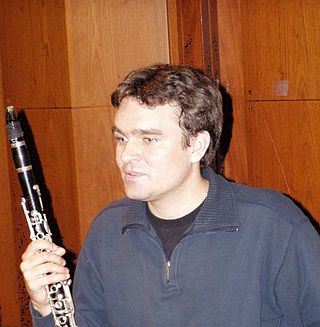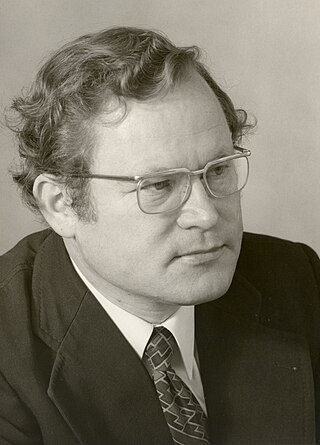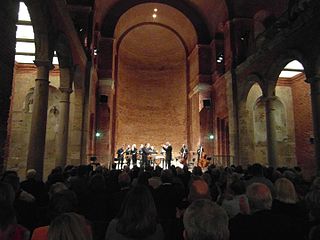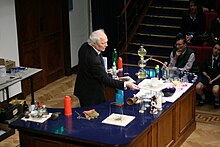
Andrew Zbigniew Szydlo is a British chemist and chemistry teacher, best known for his talks and lectures on chemistry.

Graham Waterhouse is an English composer and cellist who specializes in chamber music. He has composed a cello concerto, Three Pieces for Solo Cello and Variations for Cello Solo for his own instrument, and string quartets and compositions that juxtapose a quartet with a solo instrument, including Piccolo Quintet, Bassoon Quintet and the piano quintet Rhapsodie Macabre. He has set poetry for speaking voice and cello, such as Der Handschuh, and has written song cycles. His compositions reflect the individual capacity and character of players and instruments, from the piccolo to the contrabassoon.

Jörg Widmann is a German composer, conductor and clarinetist. In 2018, Widmann was the third most performed contemporary composer in the world. Formerly a clarinet and composition professor at the University of Music Freiburg, he is composition professor at the Barenboim–Said Akademie. His most important compositions are the two operas Babylon and Das Gesicht im Spiegel, an oratorio Arche, his string quartets and the concert overture Con brio. Widmann wrote musical tributes to Classical and Romantic composers. He was awarded the Bavarian Maximilian Order for Science and Art in 2018. He is the brother of a German classical violinist Carolin Widmann.

Piccolo Quintet is short for the Quintet op. 26 of Graham Waterhouse, composed in 1989 for piccolo and string quartet and published by Zimmermann in 2002 as Quintet for piccolo, 2 violins, viola and violoncello.
Jens Josef is a German composer of classical music, a flutist and academic teacher.
Lyndon Jeffrey Frank Watts is an Australian bassoonist. He is principal bassoonist of the Münchner Philharmoniker and an academic teacher.

Herbert Blendinger was an Austrian composer and viola player of German origin.

Bei Nacht, op. 50, is a piano trio, composed in 1999 by Graham Waterhouse, published by Hofmeister, Leipzig.

Valentina Babor is a German classical pianist. She began performing before audiences and winning youth competitions as a child. At 12, she was accepted by Karl-Heinz Kämmerling at the Mozarteum, where she became part of the university's "Initiative Hochbegabten-Förderung", a program for highly gifted students. In 2009, barely an adult, she played Rachmaninoff's Piano Concerto in C minor in concert. She continues to perform internationally.

Chinese Whispers is a composition for string quartet in three movements by Graham Waterhouse. Premiered in 2010, it combines elements from the music of China with composition techniques of Western classical music. Similar to the children's game, phrases change as they pass from part to part. The work was awarded the "BCMS Composition Prize" of the Birmingham Chamber Music Society in 2011.

Rhapsodie Macabre is a composition for piano and string quartet in one movement by Graham Waterhouse, written in 2011 as a homage to Franz Liszt. It was first performed at a Liszt festival of the Gasteig, Munich, with the composer playing the cello part.

Graham Waterhouse, cellist and composer especially of chamber music, has written a number of works for string quartet, three major works in several movements, several smaller works and compositions for a solo instrument and string quartet.

The String Sextet, Op. 1, is a string sextet in four movements by Graham Waterhouse. While the composer began the work as one movement in 1979, he completed it in four movements in 2013. The completed version was first performed at the Gasteig in Munich on 9 February 2014.

Taschenphilharmonie is a German orchestra, founded in 2005 by Peter Stangel. The chamber ensemble plays symphonic works in three series, with most concerts held at the Allerheiligen-Hofkirche of the Munich Residenz. In addition to concerts which juxtapose classical and contemporary music, they address children in a second series and listeners interested in the making of a composition in a third. The ensemble styles its name die taschenphilharmonie.

The Viola Sonata by Graham Waterhouse, entitled Sonata ebraica, was written in 2012 and 2013, and premiered in Munich in 2013. It was recorded in 2015 by Hana Gubenko and Timon Altwegg who commissioned and premiered it.

Incantations, subtitled Concerto da camera, is a composition for piano and ensemble by Graham Waterhouse, composed in 2015 and first performed in Birmingham.

Skylla and Charybdis is a 2014 composition for piano quartet by Graham Waterhouse, played in four movements without a break. The title refers to Scylla and Charybdis, two sea monsters from Greek mythology. In performances in German-speaking countries, it has also appeared in English surroundings as Between Scylla and Charybdis.

Praeludium (Prelude), Op. 32, is a piece for piano by Graham Waterhouse, composed in 1992 and published by Lienau in 2002. The virtuoso composition has been played in concert internationally, and was recorded.

Concentricities is a piano trio by Graham Waterhouse composed in 2019 for clarinet, cello and piano. It was premiered, with the composer as the cellist, at the Gasteig in Munich the same year. It was published by Schott Music.
Elisabeth Waterhouse is an English pianist and music pedagogue. She founded the National Chamber Music Course, a summer school for young string players, in 1974, and has managed it since. She is the widow of the bassoonist and musicologist William Waterhouse.










